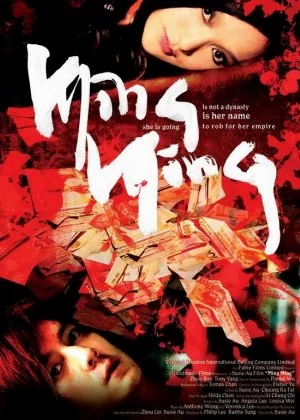Ming Ming
Susie Au's Ming Ming is one of those movies that managed create a tiny splash upon its original release. There was a little buzz, people seemed to like the film, but then it slid back into obscurity and people forgot all about it again. It's the kind of film I find fun to revisit, if only because it remained somewhat untarnished throughout the years. There's no history there, no status to consider. It's just a small, unique film that you can experience all over again, as if it was the first time you'd be watching it.

Ming Ming is closely related to Suzhou River, pk.com.cn and Baober in Love, films that represent the rise of modern Chinese cinema during the 00s. The only difference is that Ming Ming is in fact a Hong Kong film, not a Chinese one. Hong Kong isn't exactly known for its cinematic experiments, sticking mostly to refining their favored genre output. It's probably one of the reasons why Au moved the film to mainland China and attracted Xun Zhou, one of China's youngest talents to shoulder the film.
Susie Au made a name for herself directing music videos and it shows, especially during the first half of the film. While there is a clear narrative present, Au often prefers visual impressions over straight narratives, dictated by ambitious editing and wild camera angles. It's a little uncommon (and often looked down upon by more "serious" film fans), but it really brightens up the film, turning what is essentially a pretty simple romance into an exciting and adventurous endeavor.
The plot revolves around Ming Ming, a mysterious woman who is planning to steal 5 million Hong Kong dollars from her boss, in order to please the man she loves. The heist is a success, but as she flees the crime scene her partner in crime Tu runs into Nana, Ming Ming's doppelganger. The two take off to Shanghai, with Ming Ming trailing them from the shadows and protecting them whenever her former boss' henchmen get too close. While Tu and Nana think they're being chased for the money, the real issue lies with a mysterious box that Ming Ming took with her.

It's no surprise Ming Ming is a heavily visual film. The camera work is very deliberate, the editing is in your face and the characters too are extremely stylized, to the point where even the hair color has a visual impact. Ming Ming for example is darkish and goth-light, while Nana has a clear adoration for orange. It makes for a very pleasant watch, unless you're the kind of person who thinks that visuals can get in the way of the plot. Not that I find that to be the case here, the visuals are in fact an essential part of the storytelling, but it is a commonly heard complaint, so be warned.
The soundtrack is a little tougher to judge. Generally speaking I appreciate a score that dares to be different, but Au takes it in a very commercial direction, something I found clashing with the rest of the film. Maybe it's because of her background, but it would've been better if she kept the score a bit closer to the moodier atmopshere established by the visuals. It's a bit of a missed opportunity I feel, but at least Au took a chance, which is ways better than the incospicuous music most directors go for.
Spearheading the film is Xun Zhou, one of the key figures of Chinese cinema during the 00s. From indie arthouse to modern genre all the way to big blockbuster, Zhou covered it and never once looked out of place. She's perfect for her double role here and definitely deserves some of the credit for making this film work. The rest of the cast isn't really up to par, not even Daniel Wu, but considering that most of the weight rests on Zhou's shoulders it's not that big of an issue.

If you fear that Ming Ming is just one big "music video", rest assured that the film settles down a little during the second half. It's not a complete 180 of course, the core of Au's film remains very visual, but the flashy editing is toned down and the film mixes in more traditional storytelling elements. I can't say I felt it was really necessary, I'm actually quite sure I would've preferred a hyperstylized version of the film from start to finish. Then again, this little turnaround didn't really hurt the film either, so no point sulking on it.
Even after all these years, Ming Ming remains a fun, entertaining and dashing little film. The editing is slick, the visuals are stylized and Xun Zhou's performance is perfect. The soundtrack leaves a little to be desired, but at least it has character. Au does everything in her power to make it a memorable and epic journey, even so the film works better as a small, undiscovered gem with the potential of garnering a loving cult following. It's just a little too odd for the mainstream and too slick for the arthouse crowd, which, as it turns out, is exactly my sweet spot.
